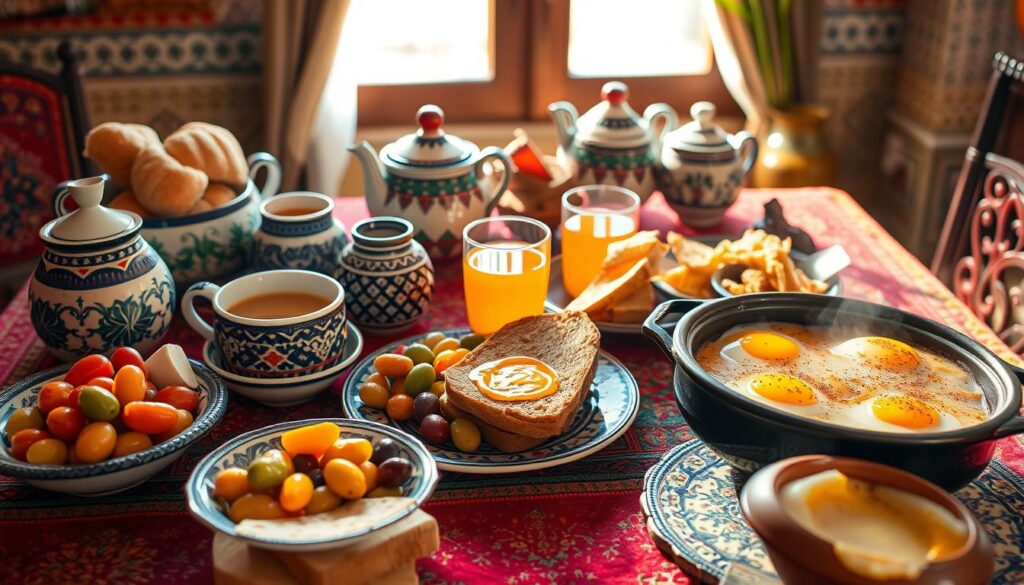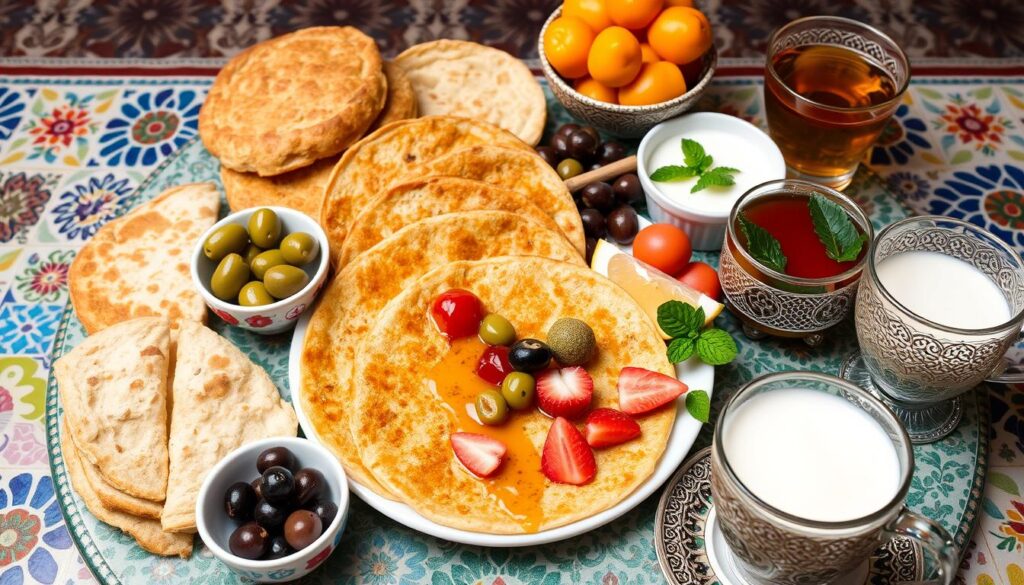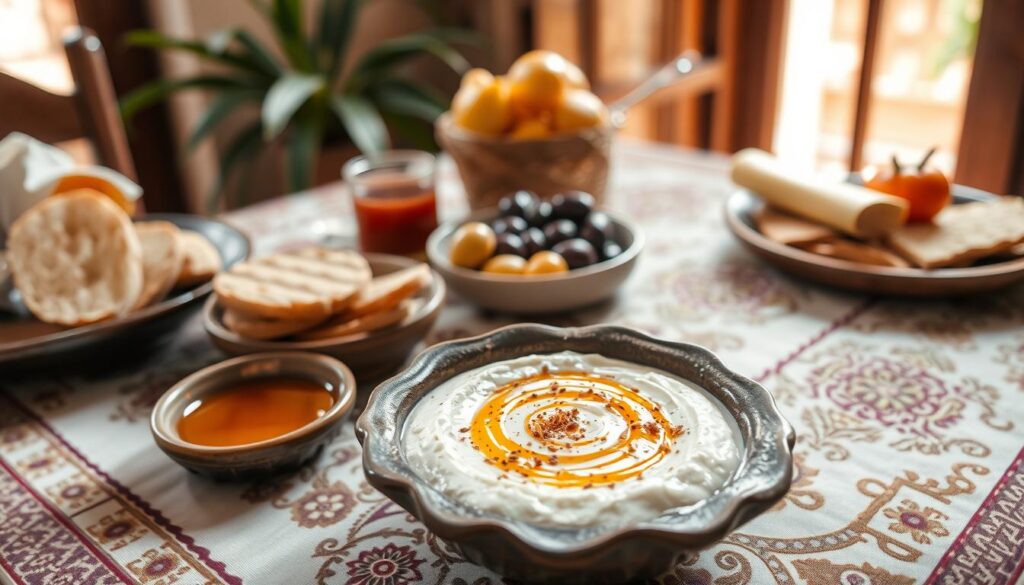Have you ever wondered why Moroccan breakfast is seen as a vibrant feast? It’s a mix of cultures and traditions. This meal is a key part of daily life in Morocco, blending Berber, Maghreb, Jewish, and Arab influences.
A traditional Moroccan breakfast is more than just a meal. It’s an experience filled with hot dishes, different breads, sweet pastries, and teas. These foods together celebrate the authentic flavors of Morocco. They show the importance of breakfast in Moroccan culture, as a time to connect with family and guests.

Key Takeaways
- Moroccan breakfast reflects the country’s diverse cultural influences.
- A variety of dishes, breads, and beverages characterize a typical Moroccan morning meal.
- Breakfast is an essential part of Moroccan hospitality and socialization.
- Popular items include mint tea, various breads, and delightful pastries.
- Morocco’s unique breakfast combinations showcase its rich culinary traditions.
The Importance of Moroccan Breakfast in Daily Life
Moroccan breakfast is more than just food; it’s a tradition that brings families and friends together. It’s a time to share meals and strengthen bonds. This ritual is key in daily life, creating a sense of community and joy.
At the heart of Moroccan breakfast is the use of fresh, local ingredients. People here value organic produce, making every dish full of flavor and health benefits. Traditional foods like khobz, msemen, and harcha are served with olive oil and honey, adding to the delight.
But Moroccan breakfast is more than just food. It’s a time for stories, laughter, and connection. Whether at home or a café, it sets a positive tone for the day. It’s a celebration of community and happiness.
What to Expect in a Moroccan Breakfast
A traditional Moroccan breakfast is a feast for the senses. It combines fresh ingredients with a variety of flavors and textures. You’ll find breads like baguettes and khobz, along with pastries such as croissants. Rich condiments like olive oil, butter, jam, and cheese like La Vache Qui Rit add to the experience.
Expect to see dishes like msemmen (savory pancakes) and beghrir (round pancakes). They come with sweet and savory toppings like honey and goat cheese. Eggs might be omelettes or eggs with khlii, a preserved meat dish. A glass of fresh orange juice, priced around 50 cents, is a popular choice.
Street-side breakfasts offer unique experiences. You might find dishes like b bean soup or lamb stomach stew for under $1. Each corner café or street vendor has their own take on Moroccan classics. They showcase the richness of this culinary tradition.
Moroccan breakfasts are rich in carbohydrates but also offer delicious vegetarian options. It’s a nourishing and satisfying start to your day. You’ll enjoy authentic flavors that keep you energized until lunchtime.
Moroccan Breakfast: A Traditional Feast of Authentic Flavors
Moroccan breakfasts start your day with a burst of flavor. They are a feast that celebrates North African cuisine. Each table is filled with a variety of dishes, showing off family recipes and the joy of sharing meals.
Freshly baked bread is key to a Moroccan breakfast. Msemmen and Baghrir are staples. Msemmen is a thin pastry made with semolina and flour, needing 20 minutes to knead and rest. Baghrir cooks fast, ready in just 3 minutes per side, perfect for honey or syrup.
These dishes offer a mix of sweet and rich flavors. Honey and olive oil add depth. Local ingredients like almonds, cumin, and saffron are essential. This makes breakfast a special event, filled with tradition and flavor.
Mint tea is a must at Moroccan breakfasts. It’s a sign of welcome and friendship. Fresh orange juice and a variety of cheeses, jams, and preserves add to the feast.
| Dish | Main Ingredients | Cooking Time |
|---|---|---|
| Msemmen | Flour, semolina, butter, and oil | 5-10 minutes per side |
| Baghrir | All-purpose flour, semolina, active dry yeast | About 3 minutes per side |
| Amlou | Almonds, argan oil, and honey | — |
| Mint Tea | Green tea, fresh mint, and sugar | — |
Moroccan breakfasts are all about sharing and enjoying flavors. This feast is a celebration of hospitality. It invites you to explore a world of authentic tastes that will excite your senses.
Popular Moroccan Breakfast Dishes
Starting your day with Moroccan breakfast dishes is a treat. It’s filled with unique flavors and aromas. You’ll enjoy refreshing Moroccan mint tea, traditional breads, and savory eggs together.
Moroccan Mint Tea: A Cherished Beverage
Moroccan mint tea is key to any breakfast. It’s made from green tea, sweetened, and infused with fresh mint. This tea is a morning ritual, bringing families together. It refreshes the meal’s hearty elements.
Traditional Moroccan Bread Varieties
Freshly baked traditional Moroccan bread is a breakfast staple. You’ll find:
- Khobz: A round, crusty loaf perfect for dipping.
- Msemen: Flaky and layered, often served with honey or jam.
- Harcha: A semolina-based bread, rich in flavor and texture.
These breads are great with olives, soft cheese, and eggs.
Delicious Moroccan Breakfast Eggs
Breakfast eggs in Morocco come in many styles. They’re often rich in flavor. You can enjoy them boiled or fried with:
- Spiced olives
- Fresh herbs
- Soft cheeses
These dishes show the diversity of Moroccan cuisine. They make for a filling start to your day. Moroccan breakfast dishes let you experience the region’s rich culinary traditions.

Savory Breakfast Options from North African Cuisine
North African breakfasts offer a variety of savory dishes. These reflect the rich traditions of the region. B’ssara and Khlea and eggs are especially popular, showing the hearty tastes found in North Africa.
B’ssara: Comforting Bean Dish
B’ssara is a warm bean soup, mainly made from fava beans. It’s flavored with paprika and garlic, making it a favorite in the cold months. Served with Moroccan bread, it’s a delicious start to the day.
Khlea and Eggs: A Hearty Choice
Khlea and eggs is another hearty breakfast choice. It includes dried meat, like beef or lamb, with fried eggs. This dish captures the essence of North African breakfasts, offering a satisfying morning meal.
Sweet Treats and Pastries for Breakfast
The joy of a sweet Moroccan breakfast is in its pastries. These treats are loved by both locals and visitors. They make starting the day special with their unique flavors.
Here are some favorite sweet pastries found at Moroccan breakfasts.
Msemen: A Layered Delight
Msemen is a traditional pancake bread with a layered texture. It’s great on its own or with honey and butter. This dish is a favorite on the streets and a must-try at breakfast.
Baghrir: The Spongy Pancake
Baghrir, or the ‘thousand-hole pancake’, is light and airy. Enjoy it warm with honey or butter for a heavenly breakfast. Its unique texture and rich toppings make it a great choice.
Sfenj: Sweet Moroccan Fritters
Sfenj are sweet, deep-fried fritters often dusted with sugar or honey. They’re a popular street snack. Enjoying Sfenj adds a taste of Moroccan culture to your breakfast.
Healthy Breakfast Options in Traditional Moroccan Cuisine
In Moroccan cuisine, you’ll find many healthy breakfast options. These dishes are full of flavor and nutrients. They often use fresh, natural ingredients like fruits, yogurt, and whole grain breads.
Fruits like citrus and pomegranates are favorites for breakfast. They add flavor and are rich in vitamins and fats. Another great choice is B’ssara, a fava bean soup. It’s high in protein and fiber, making it a nutritious start to your day.
Don’t forget to try Moroccan breads like Msemmen and Baghrir. These pancakes and flatbreads add a special touch to your breakfast. For a hearty meal, try Harira, a soup made with tomatoes, lentils, and spices. It’s perfect for any time of the year.
Enjoying these traditional dishes is not just tasty. It also helps you eat a balanced diet. It encourages you to discover more of what Moroccan breakfasts have to offer.
Accompaniments to Enhance Your Moroccan Breakfast
Adding delightful breakfast accompaniments can make your Moroccan breakfast better. They bring flavor, texture, and authenticity to your table. Amlou dip, olive oil, and butter are key, each adding its own special touch.
Amlou: A Nutty Dip
Amlou dip is a traditional Moroccan treat. It’s made from ground almonds, argan oil, and honey. This creamy, nutty spread is perfect with khobz or msemen. It turns a simple breakfast into a gourmet treat.
Olive Oil and Butter: Essential Additions
Olive oil is a key part of Moroccan breakfasts. Its unique flavor makes dishes richer and balances textures. It’s great on bread or as a dip. Butter adds a smooth richness that goes well with Amlou’s nuttiness. Together, they make your Moroccan breakfast unforgettable.

| Accompaniment | Main Ingredients | Flavor Profile | Ideal Pairing |
|---|---|---|---|
| Amlou Dip | Ground almonds, argan oil, honey | Nutty, sweet | Msemen, khobz |
| Olive Oil | Olives, extra virgin olive oil | Fruity, rich | Traditional breads |
| Butter | Unsalted butter | Rich, creamy | Msemen, toasted bread |
Finding Authentic Moroccan Breakfast Experiences
To enjoy a real Moroccan breakfast, look for local cafes and traditional riads. These places serve up delicious dishes. By exploring off the beaten path, you find spots where meals are made fresh, creating a special atmosphere.
Trying different breakfasts in various places helps you understand Moroccan food traditions. In Tangier, try B’ssara, a warm bean soup, or Msemen pancakes with goat cheese and honey. Eating breakfast with locals lets you see their morning routines and enjoy lively talks over Moroccan mint tea.
Don’t miss out on visiting famous spots. Café Hafa offers amazing views and authentic tastes. At Macondo, you can enjoy dishes like Kefta Tagine, showing off Morocco’s rich food heritage.
Conclusion
Exploring Moroccan culture means understanding the importance of breakfast. This meal is a feast of flavors and shows the value of eating together. It’s a time to start the day right with a variety of sweet and savory dishes.
Enjoying Moroccan mint tea and trying traditional breads and pastries is key. These moments bring families and friends closer. It’s not just about food; it’s about making memories together.
In Morocco’s markets and riads, you’ll see the skill in every dish. The flavors tell stories of tradition and community. This journey through Morocco’s cuisine is an adventure you’ll never forget.
FAQ
What is a traditional Moroccan breakfast like?
A traditional Moroccan breakfast is a feast for the senses. It includes fresh breads, rich teas, and sweets. You’ll find Moroccan Mint Tea, various breads, and dishes like fried eggs and B’ssara.
Each meal highlights authentic flavors. It shows the rich diversity of Moroccan cuisine.
Why is breakfast important in Moroccan culture?
Breakfast is key in Moroccan culture. It’s seen as the most important meal of the day. It’s a time for families and friends to come together.
They share stories and enjoy nourishing foods made from fresh ingredients. This strengthens cultural bonds and hospitality.
What are some popular dishes you can find in a Moroccan breakfast?
Popular dishes include Moroccan Mint Tea and Khobz (traditional bread). You’ll also find fried eggs, B’ssara (fava bean soup), and Msemen (layered flatbread).
Don’t forget sweet treats like Baghrir (hundred-hole pancakes) and Sfenj (deep-fried fritters). Each dish offers a unique taste of North African cuisine.
Are there healthy breakfast options in Moroccan cuisine?
Yes, Moroccan breakfasts offer healthy options. You can enjoy fresh fruits, yogurt, and whole grain breads. Dishes like B’ssara are rich in protein and fiber.
The focus on organic and locally-sourced ingredients makes meals nutritious. They’re great for your health.
How can you enhance your Moroccan breakfast experience?
To make your Moroccan breakfast better, try Amlou (a nutty dip). Use olive oil and butter as spreads. These add depth and flavor to your meal.
They make your breakfast even more satisfying.
Where can you find authentic Moroccan breakfast experiences?
To find real Moroccan breakfasts, look for local cafes or traditional riads. They’re known for their culinary offerings. Be adventurous and try less commercialized spots.
Here, you can enjoy freshly made meals with locals. It enhances your cultural exploration.
Source Links
- https://moroccoinsightexcursions.com/traditional-moroccan-breakfast/ – Moroccan breakfast recipes: what to eat in Moroccan breakfast
- https://travellingjezebel.com/21-traditional-moroccan-breakfast-foods/ – 21 Traditional Moroccan Breakfast Foods – Travelling Jezebel 21 Traditional Moroccan Breakfast Foods
- https://www.theworldinmypocket.co.uk/traditional-moroccan-food/ – Discover the Aromatic Flavours of the Traditional Moroccan Food – The World in My Pocket
- https://nettachetas.com/the-ultimate-guide-to-traditional-breakfasts-around-the-world/ – The Ultimate Guide to Traditional Breakfasts Around the World
- https://culture-insider.com/blog/the-art-of-moroccan-cuisine – The Art of Moroccan Cuisine
- https://www.savoringthegood.com/moroccan-breakfast-recipes/ – Moroccan Breakfast Foods
- https://marocmama.com/moroccan-breakfast-ideas/ – Moroccan Breakfast Ideas Worth Waking Up For!
- https://www.citynibbler.com/home/2018/11/19/moroccan-cuisine-what-to-eat-when-you-visit-morocco – Moroccan Food – What to Eat and Drink When You Visit Morocco — City Nibbler
- https://mymoroccanadventure.com/blog/2019/5/4/ftour-aka-moroccan-breakfast – Moroccan Breakfast — My Moroccan Adventure
- https://thepetitgourmet.com/amazing-moroccan-breakfast/ – Amazing Moroccan breakfast –
- https://epicureandculture.com/traditional-moroccan-breakfast-foods-recipes/ – 7 Traditional Moroccan Breakfast Foods (With Easy Recipes!)
- https://www.moroccopedia.com/best-of-moroccan-breakfast/ – Best of Traditional Moroccan Breakfast
- https://theculturetrip.com/africa/morocco/articles/10-mouthwatering-moroccan-breakfasts-to-try – 10 Mouthwatering Moroccan Breakfasts To Try
- https://nourishedbynic.com/moroccan-shakshuka/ – Moroccan Shakshuka
- https://silkroadrecipes.com/moroccan-shakshuka/ – Moroccan Shakshuka Recipe + Video
- https://www.chefspencil.com/moroccan-desserts/ – 15 Famous Moroccan Desserts – Chef’s Pencil
- https://primemoroccotours.com/moroccan-sweets-best-moroccan-dessert-recipes/ – Moroccan Sweets: Best Moroccan Dessert Recipes
- http://blog.travel-exploration.com/2009/04/12/moroccan-sweets-and-pastries/ – Moroccan Sweets and Pastries, North African Deserts & Recipes
- https://www.eatwith.com/blog/authentic-moroccan-food-5-must-try-moroccan-dishes-in-marrakech-cm2kn6d6v005tcucjfl50ti0v – Authentic Moroccan Food: 5 Must-Try Moroccan dishes in Marrakech
- https://outsidesuburbia.com/10best/moroccan-food-in-morocco/ – 10 Moroccan Dishes & Food you MUST try in Morocco
- https://fotw.com.au/blog-iconic-dishes-drinks-in-morocco/ – Traditional Moroccan Dishes and Foods – FOTW
- https://www.foodandwine.com/comfort-food/moroccan – Make Your Kitchen Smell Amazing With These 27 Moroccan Food Recipes
- https://whatsgabycooking.com/moroccan-dinner-party-menu/ – Moroccan Dinner Party Menu – What’s Gaby Cooking
- https://curatetrips.com/morocco/food-in-morocco-25-traditional-dishes/ – The Ultimate Guide to Food in Morocco: 25 Traditional Dishes to Try | CÚRATE Trips
- https://amazingfoodanddrink.com/exploring-traditional-cuisine-in-morocco/ – The Best of the Traditional Cuisine In Morocco
- https://oneplanetjourney.com/taste-morocco-breakfast-tour-with-locals-tangier/ – Taste Morocco – A Breakfast Tour with Locals in Tangier
- https://www.moroccopedia.com/an-introduction-to-moroccan-cuisine/ – Introduction to Moroccan Cuisine
- https://privatedeserttours.com/authentic-moroccan-cuisine/?srsltid=AfmBOoo3XbowbTDjZkFc_5z1Jy15u95qajFmNF9pTfW9yWbttstRPjqc – Authentic Moroccan Cuisine: Indulge in Flavors of Traditional Food Tours
- https://www.foodnerdrockstar.com/eat-and-travel/a-taste-of-marrakech-a-culinary-adventure-in-the-red-city – A Taste of Marrakech: A Culinary Adventure in the Red City – Eat & Travel – Food nerd rockstar
